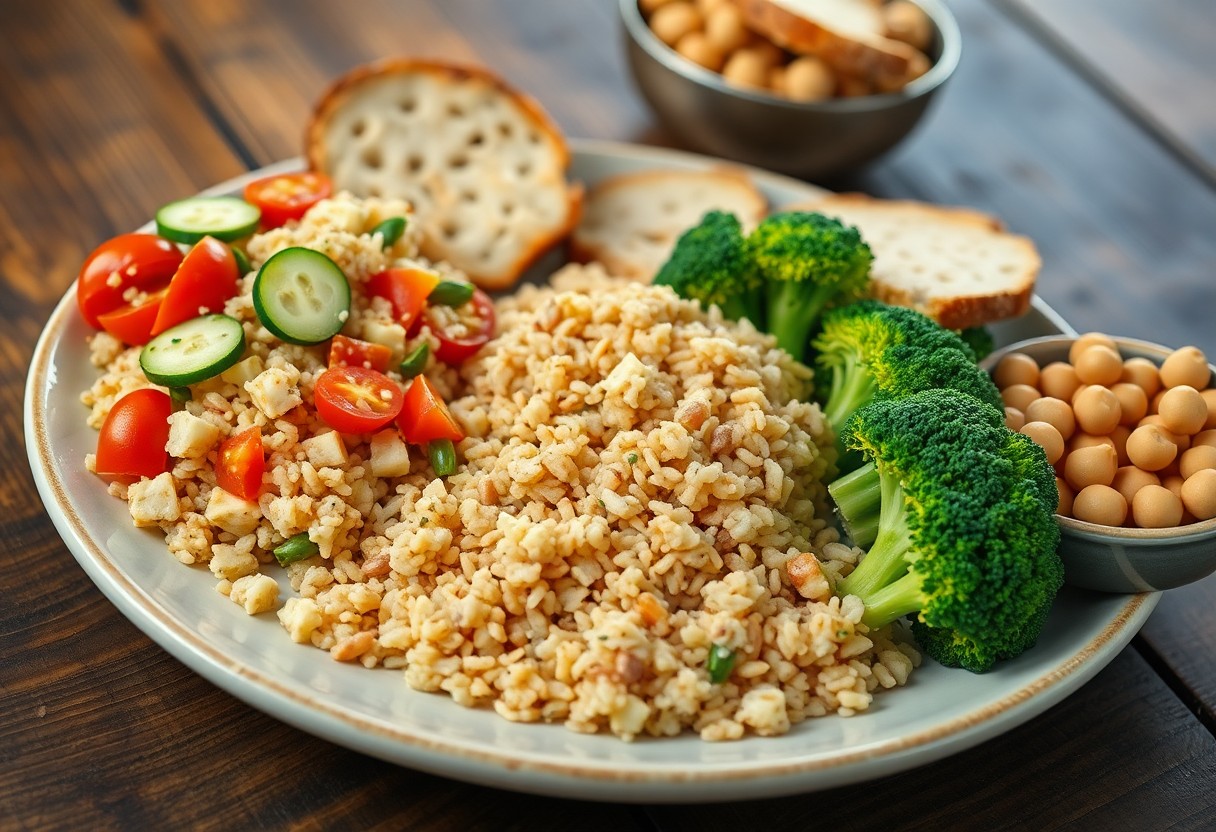Just as your body thrives on balanced nutrition, incorporating healthy carbohydrates can significantly enhance your energy levels and support digestion. With the right choices, you can fuel your day effectively while ensuring your digestive system functions optimally. This post will guide you through the best food sources of healthy carbohydrates that will contribute to your overall well-being and vitality.

Key Takeaways:
- Incorporate whole grains such as quinoa, brown rice, and oats for sustained energy and better digestion.
- Fruits and vegetables are excellent sources of natural carbohydrates, fiber, and crucial nutrients.
- Legumes like lentils and beans provide complex carbohydrates along with protein and fiber for digestive support.

The Energetic Edge: Carbs That Fuel Your Day
Healthy carbohydrates provide the necessary energy to power through daily activities. By incorporating the right sources into your meals, you can sustain your energy levels while supporting overall health. From whole grains to fruits, these carbohydrate-rich foods do more than just satisfy hunger; they fuel your body and mind for optimal performance throughout the day.
Whole Grains: The Power of Fiber and Nutrients
Whole grains, such as quinoa, brown rice, and oats, are packed with important nutrients and fiber that promote digestive health. Unlike refined grains, whole grains retain their bran, germ, and endosperm, providing a richer source of vitamins, minerals, and antioxidants. The fiber content aids in maintaining stable blood sugar levels, keeping you feeling full and energized longer.
Fruits: Natural Sugars That Recharge Your Body
Fruits are nature's convenient energy boosters, offering natural sugars alongside vitamins, minerals, and hydration. Whether you reach for bananas, apples, or berries, each option provides important nutrients that help recharge your body throughout the day. Eating a variety of fruits ensures that you receive an array of benefits, from antioxidants to fiber.
Bananas, for example, are rich in potassium and provide a quick source of energy, making them an ideal pre-workout snack. Apples contain pectin, a soluble fiber that helps regulate digestion and provides a sustained energy release. Berries boast high levels of antioxidants, which can help reduce inflammation and combat oxidative stress. Incorporating a mix of these fruits not only satisfies your sweet cravings but also supports your body’s performance and vitality.
The Digestive Duo: Carbs That Keep You Regular
Incorporating fiber-rich carbohydrates into your diet ensures regular digestion, promoting gut health and overall well-being. Foods such as whole grains and starchy foods and carbohydrates enhance stool bulk and support movement through your intestines, making it easier to maintain a healthy digestive system.
Legumes: Protein-Packed and Gut-Friendly
Legumes, including lentils, chickpeas, and beans, are not only high in protein but also rich in fiber, which plays a vital role in digestion. This fiber helps regulate bowel movements and supports a healthy microbiome by feeding beneficial gut bacteria.
Vegetables: Low-Calorie Carbs That Promote Health
Vegetables serve as excellent low-calorie carbohydrate sources, loaded with vital vitamins and minerals. Leafy greens, broccoli, and carrots are notable examples that enhance digestion through their fiber content while also aiding in weight management. Regularly including a variety of these vegetables in your meals can help prevent constipation and contribute to a healthy digestive tract.
Transforming Your Plate: Practical Tips for Incorporating Healthy Carbs
- Choose whole grains over refined options.
- Incorporate more fruits and vegetables into each meal.
- Experiment with legumes as protein-rich carb sources.
- Consider meal prepping to simplify access to healthy options.
- Thou shall not overlook the importance of portion control.
Meal Planning: Strategic Choices for Energy and Digestion
Strategic meal planning can help streamline your choices, pairing healthy carbohydrates with proteins and fats for balanced meals. Include a variety of sources such as quinoa, sweet potatoes, and brown rice to keep your meals interesting and nutrient-dense. Aim for colorful fruits and vegetables to ensure a wide range of vitamins and minerals, which enhance energy levels and digestion. Prepare your meals in advance to prevent impulse choices that may include heavily processed carbs.
Cooking Methods: Enhance Nutrient Absorption
The way you prepare your food can significantly affect nutrient availability. Steaming, roasting, or sautéing vegetables helps retain water-soluble vitamins, maximizing your intake from healthy carbs. Soaking grains and legumes beforehand can reduce cooking time, enhance digestibility, and improve nutrient absorption. Always consider complementary flavors and seasonings that elevate the taste while ensuring more enjoyable nutrient-rich meals.
Expanding on cooking methods, steaming vegetables like broccoli or carrots preserves their vitamins better than boiling, making them a smarter choice for side dishes. Opt for whole grains such as farro or barley that require less cooking time when soaked, enhancing nutrient uptake and reducing cooking-related nutrient loss. The Maillard reaction during sautéing or roasting brings out complex flavors, encouraging you to eat more nutrient-dense options while enjoying the cooking process.Busting Myths: Debunking Common Misconceptions About Carbs
Many misconceptions surround carbohydrates, often leading to their unfair demonization in diets. You might hear that all carbs are unhealthy or lead to weight gain, but this simply isn't true. In fact, understanding how to choose Carbohydrates: How carbs fit into a healthy diet can help you utilize them wisely for energy and overall wellness.
Carbs and Weight Gain: The Real Story
Weight gain primarily results from an excess of calories consumed over calories burned, not merely from carbohydrate intake. You can maintain a healthy weight by balancing your carb consumption with physical activity. Opt for whole, unprocessed carbs, and avoid added sugars and refined products to promote better health without the worry of unwanted weight gain.
Low-Carb Diets: Who Benefits and Who Doesn’t
Low-carb diets can be beneficial for certain individuals, particularly those with insulin resistance or type 2 diabetes, as they may help regulate blood sugar levels. However, for athletes or those engaged in high-intensity training, carbohydrates are important for optimal performance and recovery. Personal goals, activity levels, and metabolic health should guide the decision to pursue a low-carb approach.
Individuals who are sedentary or looking to maintain general wellness may not need to drastically reduce carbohydrates, as whole grains and fruits can provide important nutrients and energy. If you’re considering a low-carb diet, assess your lifestyle, preferences, and health conditions. Tailoring your carbohydrate intake based on personal needs will yield the best results. Balanced nutrition ultimately supports sustainable weight management and energy levels.
Mindful Eating: Cultivating a Healthy Relationship with Carbs
Mindful eating encourages you to engage fully with your meals, fostering a deeper connection with food choices, particularly carbohydrates. By focusing on the experience of eating—savoring flavors and textures—you can develop a healthier relationship with carbs. Explore resources on Choosing Healthy Carbs | Diabetes to learn how to make informed decisions that align with your energy needs and overall well-being.
Portion Control: Understanding Balance and Moderation
Effective portion control aids in achieving a balance that supports your energy levels without overwhelming your system. Using visual cues, like a plate divided into sections for carbs, proteins, and fats, helps manage portions. Strive for moderation by listening to your body’s signals, which will help you determine the right amounts for your needs.
Listening to Your Body: Recognizing True Hunger
Understanding true hunger involves distinguishing between physical hunger and emotional cravings. Tuning in to your body’s signals enables you to respond appropriately by eating when you're genuinely hungry and moderating intake to sustain energy. This practice can lead to healthier choices and stability in your carbohydrate consumption.
Recognizing true hunger requires you to become aware of physical sensations versus emotional triggers. Instead of reaching for food out of boredom or stress, pause and assess your energy levels. Ask yourself if you feel empty or if you’re simply craving comfort. Keeping a food journal can assist in identifying patterns and help you differentiate between when you’re truly hungry and when you might be seeking food for emotional reasons. This awareness cultivates a more balanced approach to eating carbohydrates, allowing you to nourish your body effectively.
Summing up
Conclusively, incorporating healthy carbohydrates into your diet is important for enhancing your energy levels and promoting optimal digestion. Foods such as whole grains, legumes, fruits, and vegetables not only provide sustained energy but also supply vital nutrients and fiber that support your body’s functions. By choosing these nutrient-dense sources, you can effectively fuel your daily activities and improve your overall well-being. Prioritize these foods in your meals to experience the benefits of balanced carbohydrate intake.
FAQ
Q: What are healthy carbohydrates?
A: Healthy carbohydrates are nutrient-rich foods that provide energy, support digestion, and contain fiber, vitamins, and minerals. Examples include whole grains, fruits, and vegetables.
Q: How do healthy carbohydrates help boost energy levels?
A: Healthy carbohydrates break down into glucose, which is the body's primary source of energy. Foods like oats, quinoa, and sweet potatoes provide sustained energy and prevent spikes and crashes.
Q: What are the best food sources of healthy carbohydrates?
A: The best sources include whole grains (brown rice, quinoa, whole wheat pasta), fruits (bananas, berries, apples), starchy vegetables (sweet potatoes, squash), and legumes (beans, lentils).
Q: How do healthy carbohydrates support digestion?
A: Healthy carbohydrates are often high in dietary fiber, which promotes regular bowel movements, helps control blood sugar levels, and supports gut health by providing prebiotic benefits.
Q: Can I include healthy carbohydrates in a weight management plan?
A: Yes, including healthy carbohydrates in a balanced diet can promote satiety and provide important nutrients while supporting weight management when consumed in appropriate portions.

0 Comments